AN INTERVIEW WITH EDWARD ABBEY…
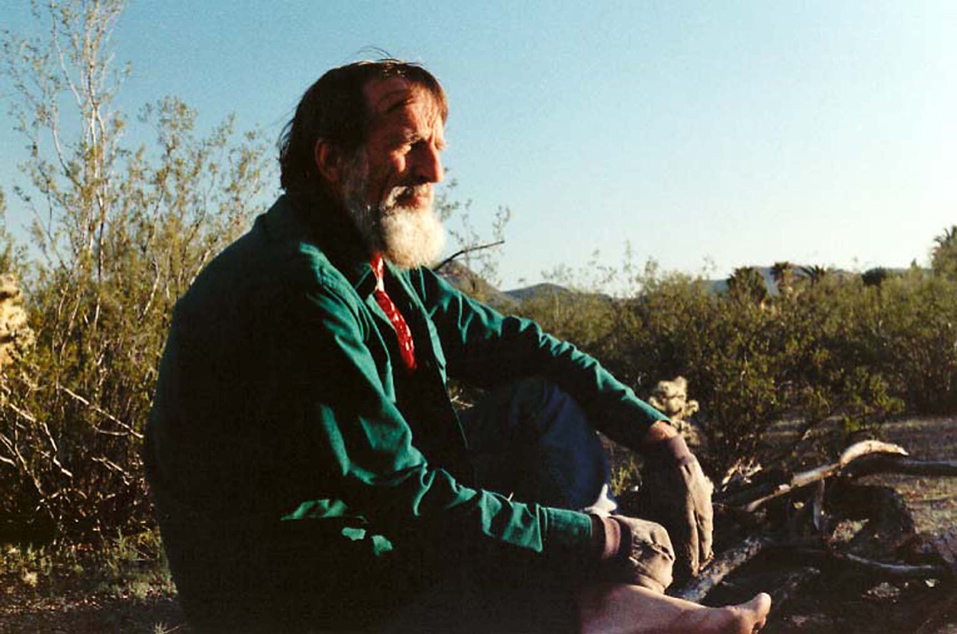
What follows is the transcript of an interview conducted by Eric Temple with Ed Abbey in December 1982. The interview took place in the cabin behind Abbey’s Tucson home and was videotaped for a program produced by KAET-TV in Phoenix, Arizona. Portions of the interview were made into a half hour program called “Edward Abbey’s Road” which aired in Arizona and many PBS stations nationwide in 1983. Thanks to Clarke Abbey for permission to print this excerpt.
ET) What do you see as the major environmental problem in Arizona right now?
EA) Progress. Development, Growth, Industry–everything that the politicians and the chamber of commerce loves, I’m against. I think it’s gradually destroying Arizona, and I don’t think it will survive–I think we’re using up our resource base, especially water, much faster than it can ever be replaced. Therefore, unless some sort of technological miracle saves us, I imagine that Phoenix and Tucson will be small towns again, and probably very nice places to live.
I was just reading a very good book by Charles Bowden, “Killing the Hidden Waters” which goes into this subject in great detail, historical and geological. He describes how the Papago Indians survived out here simply by living off the land, mainly hunting and gathering. Surviving on surface water–a few springs and flash floods for farming, and they got by for 10, maybe 20 thousand years. ‘Course they didn’t create what most of us would consider a very brilliant civilization, but they had a satisfying way of life and were probably as happy as most modern Americans.
ET) What would be the final straw that would make the politicians curtail the growth, or attempt to curtail it?
EA) I don’t think they will, they’re in the grip of a kind of ideology of growth, the politicians, the chamber of commerce, most business people in the state. They seem to really believe that growth is a good in itself and more growth is better, so I doubt if this expansion will be curtailed until something very unpleasant happens. Probably we’ll discover more pollution in our ground water supplies. The wells for example, some of them, dozens I guess have already been closed in this area and other Arizona towns. And the river water they’re hoping to import from the Colorado river is very low quality water, high salt content and god knows what other junk is in it from all of those uranium mills upstream- So at enormous cost they’re pumping that dirty river water out of the mountains and into the central valley in hopes of keeping the expansion of Phoenix and Tucson continuing for maybe a few more decades. It might work–and it might not, and even it it does work, I think it does more harm than good.
I can’t see that anything is gained for the people who now live in Phoenix by trying to make Phoenix another LA. And I think we in Tucson have much more to lose than to gain by trying to catch up with Phoenix. And Flagstaff wants to be another Tucson, and so on. And I think it’s ridiculous. It’s insane in the long run, rational point of view.
If we were content to maintain a relatively small population in this state, I don’t know what the optimum would be, we’ve probably already passed it. But if we were content just to support the number of people we’ve got here now, I don’t see anybody forced to leave. I don’t want to leave, I still love it here. I think we could probably support the present population of Phoenix and Tucson for a long time, maybe a century or two, while slowly using up our ground water supply. But if we continue this what I consider crackpot expansion, this ideological growth, why we’re going to run up against the limits much quicker, then they’ll start talking about dragging icebergs up from Antarctica and up the Sea of Cortez, through Puerta Punasco, Gila Bend, towing them on giant barges.
ET) Something else that goes hand in hand with that is the generation of electricity. Coal and Nuclear seem to be the substances of choice for the utilities in Arizona. What are the pitfalls of that?
EA) Well, the disadvantages of coal are pretty obvious. The burning of coal pollutes the air, strip mining destroys a lot of good rangeland depriving ranchers and Navajos of their resource base. And coal too is just a temporary fix, even though we may have an awful lot of it in this country. It too will be used up sooner or later, but we want to create a long term civilization here in the west or in North America, and I think eventually we’re going to have to rely on renewable resources, like sunlight and grass and trees, surface water, running water.
But I realize that the United States for that matter doesn’t take it seriously. The people who run this country assume that technology and science will rescue us each time from our foolishness, and so far it might appear that they’ve been right. However, when we burn up the planet then we’ll, I suppose, try to export the human species into outer space. Space colonies. Colonize the moon, Venus, Mars, and that’s utopianism. And uranium, you mentioned that didn’t you? When they complete the Palo Verde nuclear plant we’re going to have the biggest one in the world, is that right?
ET) That’s what they say.
EA) I find nuclear power very unappealing, first of all because it’s undemocratic; it centralizes control. It puts our lives and livelihoods in the hands of a very few people, probably one big utility, one big public agency over which the public has very little control. And of course there are the well known dangers of it. (Editor’s note: Abbey gave this interview five years before the nuclear disaster at Chernoble) There’s no guarantee that these nuclear plants won’t break down, melt down and maybe force the evacuation of the entire city of Phoenix someday. And it’s a very expensive form of power; I don’t know the economic details but it may turn out to cost more that it’s worth…simply in dollars. Nuclear power has been a heavily subsidized industry so far, subsidized by us taxpayers in one way or another and that’s how it has survived as long as it has. I doubt if nuclear power would last another 10 years if we had a really free market economy. It’s expensive and it’s dangerous and it’s undemocratic, and uranium mining of course also destroys rangeland again, in some cases wilderness. And the problem of what to do with the nuclear waste has still not been solved. Nobody wants these nuclear waste dumps in their own state.
ET) What is the future of environmentalism as you see it?
EA) Well I think that it has a very good future. The worse the environment gets, the more popular environmentalism becomes. People like James Watt do us a lot of good to spur interest in environmentalism and boost membership in all sorts of conservation organizations. People always get concerned about things that they are in danger of losing…though it often comes too late. I think America has led the way in this field. We are probably the most environmentally conscious, big industrial nation on earth, getting the parks established over a century ago. First nation on earth to do that. Good thing we did too.
I’m not much of a prophet. I suppose the conflict between conservation and development will grow more intense each year with the pressure of a growing population and economic demands. That’s all I can see in the future, more conflict, more arguments, more shouting. Possibly if the economy stays in a recession long enough, a majority of us will gradually adapt to a simpler, a more frugal way of life. Not make such enormous demands on the land, the air, and the water. But there’s so many of us in the United States already, 240 million I guess and still growing.
(Editor’s note: Since this interview the U.S. population has increased to nearly 315 million.)
The rate of growth is supposed to be slowing down, but the total keeps growing. When I was a kid in school, we were taught that the population of the United States was 120 million, as if that were a fixed, permanent figure. And now it’s apparently just about doubled.
And all of us want to maintain our American standards of living. We like having these nice little houses, electricity, running water, cars and pickup trucks and motor boats; its hard to give up all of these technological toys. We wouldn’t have to give them up in fact, if we had a small population. I guess I’m sort of a nut on the subject of planned parenthood. I think we should plan it a lot more intensively. I’d be in favor or revising the income tax structures in such a way as to reward single people, childless couples, penalize heavy breeders. Make people that have more than say two children pay extra taxes instead of less. Make that a national public policy to encourage small families. And that means cutting off immigration too. Restricting it to a very low level. These are very delicate, touchy subjects, especially here in Arizona.
And that’s why I bring it up. I don’t like to talk about it. Makes me sound like a racist and an elitist. But I talk about it because apparently no one else will. The politicians won’t touch the subject of course. And the chamber of commerce doesn’t care, they welcome a growing population. That means more demands for more goods…more extensive exploitation of the land and water and the air. Strip mining the ranges, and clear cutting the forests, and damming the last of the free-flowing rivers. But I think if we’re going to have a decent future in this country, and I’m only speaking of the United States, the rest of the world is…most of it is in much worse shape than we are. If our children and grandchildren are going to have a decent life in this country, we’re going to have to reduce the total population gradually by attrition, letting old farts like me die off…cutting off immigration, especially illegal immigration, gradually adopting, adapting to a simpler lifestyle…doing without more things. Giving up all of our gadgets…or making them so expensive that you have to choose. So you could have a car or a pickup truck but not both, that’s kind of ridiculous. Things like that, a gradual…I wouldn’t call it a reducing of the standard of living, but a simplifying of our way of living. And I think it would be good for us…be good for us to do more walking, or to ride bicycles to school instead of driving a car.
These are old ideas of course, people have been preaching them now for ten or fifteen years. I don’t have any new ideas on the subject…just repeat the old ones. I think there’s a great popular support for these basic ideas…great popular support for environmentalism, all the polls, all the elections seem to suggest it. Most of the voters want their clean air, they want their clean air laws not only maintained, but strengthened. Most people seem to want our wilderness area preserved. Most people apparently would prefer to live a more outdoorsy sort of life. To get away from the big cities, and even the suburbs now. Apparently more and more people are moving back to small towns or even to farms if they can manage it. But I think environmentalism has popular support, has majority support, but we don’t have the money…we don’t have the power to translate that popular support into political action or have the power to translate that popular support into political action or at least not into enough political action.
Power still lies in the hands of corporations and those with lots of money to throw around.
ET) You’ve made some appearances for an environmental group called Earth First!, and certainly a couple of your books have talked about sort of ecological sabotage, or taking things into your own hands. Do you see that as a coming thing, or is it already here?
EA) Well I’m not going to advocate sabotage publicly on the federal airwaves here. But I think there probably will be more of it if the conflict between conservation and development becomes more intense, and it the politicians fail to follow the popular will on the matter. I think a lot of people are going to become very angry and they’re going to resort to illegal methods to try to slow down the destruction of our national resources, our wilderness, our forests, mountains, deserts. What that will lead to I hate to think. If the conflict becomes violent and physical then I’m pretty sure the environmentalists will mostly end up in prison or shot dead in their tracks. So I hope we can save what’s left of Arizona and the United States by legal, political means and I still think we can. I still vote in elections…even though there doesn’t seem to be much to vote for or against, when there’s not much choice. I think if enough people get sufficiently concerned, why we can still make changes…needed changes in this country by political methods…God, I hope so.
ET) What does the future hold for you, what are your plans?
EA) Oh, write a few more good books and die. I’ve done almost everything I’ve ever wanted to do. Traveled over half the world, enjoyed the love of some good women, and the friendship of some good men. Had some adventures. Wrote a few books that I’m still pleased with. Had a pretty soft easy life. Most of my life I’ve been able to do exactly what I wanted to do. I haven’t had to turn my hand at honest labor for about ten years. And I never did believe in working for more than six months our the the year at any job I didn’t like. So I’ll write a few more books, explore a few more places. I’d like to go to Australia again. I’d like to see something of Africa. I’ve got a teenaged daughter, got to get her through the agonies of adolescence before I can shunt her off to college.
I’d like to grow wise and venerable, but I haven’t figured out how to do it yet.
ET) Do you see any positive thing…We’ve been talking about a lot of things that are pretty unpleasant. Is there something happening that you see in the world today that might be interpreted as a positive thing?
EA) Oh, the arts are thriving. Music, literature, dance, sculpture, painting, seems to me in this country and in most of the world there’s a great burgeoning artistic activity. I think modern technology has created a sort of world culture which may in some ways actually be bringing people together or creating an international culture, and that may turn out to be a good thing.
Nuclear power has made war less appealing than ever. Hydrogen bombs take all of the fun out of war. I think there’s an enormous amount of goodwill and good feeling being shared around the world, people visiting one another. Visiting one another’s countries and lands, getting to learn something about each other. But this is in a race against the other catastrophe of overpopulation, war, hunger, civil war, revolution. Not that I’m against revolutions…I think may of them are necessary and therefore are justified. I’m not anti-technology either. I like all of our gadgets and toys, it’s just the scale of them that I think is doing us harm. As I’ve written, I’m very much in favor of space exploration for example, I think it’s a great adventure for humanity insofar as we can all share in it. But I think it should be supported by voluntary contributions only. Not by compulsory taxation under threat of prison and death. The Sierra Club gets by on voluntary contributions and so should NASA, and moon shots, and space travel. Let those things be financed by people who are willing to support them.
Good things, I’m trying to think of good things!
You can still get good cigars. I’m impressed by the young people that are growing up around us. They seem to be healthier, more athletic and brighter than ever. At least the ones who haven’t been lobotomized by too much television and Newsweek and Time. I suppose for every danger in the contemporary world you can find a corresponding avenue of hope, an opportunity for true progress, as opposed to mere quantitative growth. Probably never before in human history have so many been so keenly aware of what our troubles are and what causes them and what can be done about them. I think the knowledge and the goodwill is here, present in most people. Our problem is how to translate that knowledge and goodwill and technique into the creation of a true civilization, which I do not think we have.
Kurt Vonnegut says we’re still living in the dark ages, I agree with that. But we’re still struggling to get out of the dark ages into some kind of enlightenment, I think that’s possible. Still might happen before disaster solves all our problems. If we don’t solve our troubles by reason and goodwill and generosity and mutual aid and sharing, then I think our troubles, national and international, will be solved in the usual way. By catastrophe. By war, famine, plague…what was the fourth horseman? Death.
And anyway, even if the human race wipes itself off the face of the earth as Jonathan Schell thinks it might in his book, I still think that life will survive, even if only in the most rudimentary form. I’m in favor of all kinds of life, even bacteria, germs, bugs, insects, scorpions. I don’t think that anything humanity can do will destroy all life on earth. And as long as there’s life in any shape, why there’s still hope of some kind.
In fact life is good in itself. If we humans are stupid enough to destroy our own lives, that doesn’t necessarily take all of the goodness out of the lives of other creatures that might, and I hope will, survive us. I think earth would still be a decent place if there were no humans on it at all. I don’t know exactly what kind of consciousness a dog has, or the wildlife or the birds we see out here, but my impression is on the whole they seem to enjoy their existence and I think it’s worthwhile for its own sake. They’re not dreaming of heaven or some technological utopia. They just find the ordinary daily business of life, breeding, nest building, and finding food a good in itself, and I agree with that. I think the hawks are right and the rattlesnakes. Keep going…continuity.
I don’t have any hope of personal immortality, but I am glad I’ve had children. And that therefore I have a stake in the continuity of human life. I think it’s well worthwhile just keeping the game going, whether it leads to any greater end or not. Well, enough of mesophysics. Do you have any simple, easy questions?
ET) Yeah, I’ve got one more. What do you see your role as? social commentator, author?
EA) My role…I see myself as an entertainer. I’m trying to write good books, make people laugh, make them cry, provoke them, make them angry, make them think if possible. To get a reaction, give pleasure. I do not see myself as a social commentator because I don’t look at any of these things we’ve been talking about hard enough, I’m not really skilled at it.
But I like to write. I like to throw words around. And if I can give pleasure in that form I feel I’m earning my pay. I have no desire to be a leader of any kind, I dislike being called a guru. I think every man should be his own guru, and every woman her own gurette…we should all be leaders. I’m an anarchist. My father was a Wobblie. I.W.W. We should all take charge. We should all be leaders, neither followers nor rulers, make our own decisions. I’m really a democrat, small “d”, I really believe in democracy. Direct democracy.
I think every issue of any importance should be decided by popular referendum. It’s nice to see these petitions get on the ballot. The process should be made much easier. If we could do away with those bunch of morons and moral dwarfs up in the state legislature and decide state policy by public referendum, I would love to see that. I think the majority of the people in this state and in this country are almost always far ahead of those who call themselves the authorities, or presume to be our leaders. They’re not leaders. What was the last leader we had in this country? Thomas Jefferson perhaps. Anyway, my role is just to write books. I’m not really trying to do anything more than that. Write some good books, if possible, and enjoy my life…the lives of my family and friends, and my enemies. I enjoy their problems too.
Eric Temple interviewed Ed Abbey on several occasions. His documentary, Edward Abbey: A Voice in the Wilderness is available on video. He is also the administrator of the facebook page: “EDWARD ABBEY: A VOICE CRYING IN THE WILDERNESS.”
To read the PDF version of this article, click here. and here.

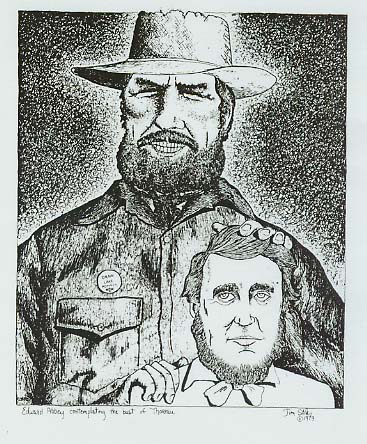
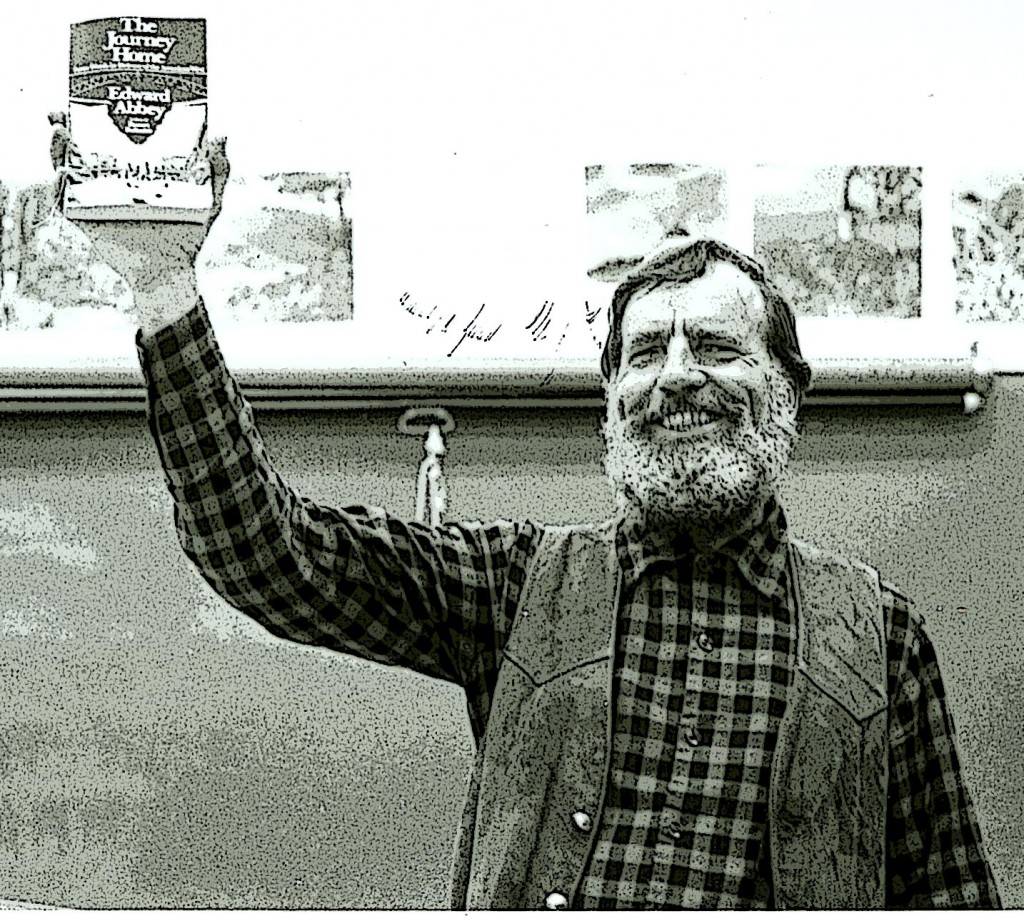
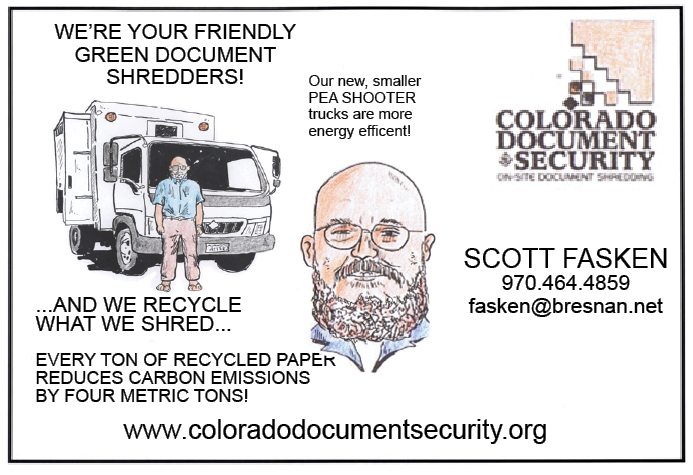


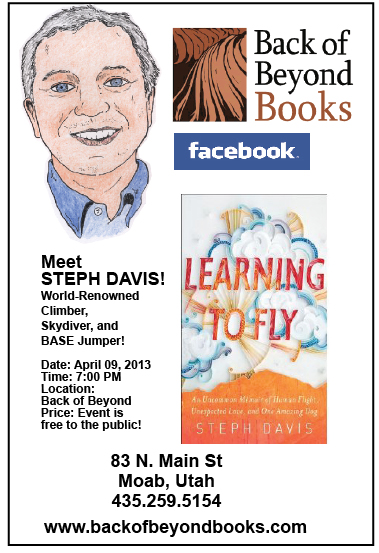
Jim-
Thanks for publishing this interview, Ed Abbey is my (and many of our) personal idol, this is important to continue his legacy.